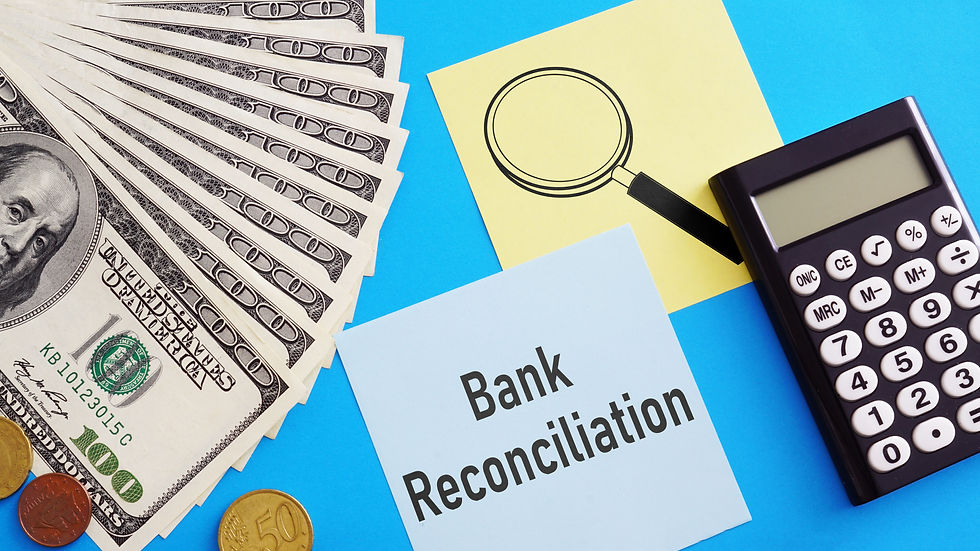The Importance of Reconciling Your Accounts Before Filing Taxes: A Crucial Financial Practice
- Pamela Vantine
- Feb 21, 2024
- 2 min read

In the world of finance, meticulous attention to detail is not just a virtue; it's a necessity. As tax season approaches, individuals and businesses alike are gearing up to file their taxes diligently. However, a concerning trend persists: many accounts are not reconciling their bank and credit card statements before filing taxes. In this blog post, we delve into why reconciling accounts before tax filing is imperative for financial health and compliance.
Why Reconciling Matters
Reconciliation is the process of ensuring that the transactions recorded in your accounting system match the transactions on your bank and credit card statements. It serves as a crucial checkpoint to verify the accuracy and completeness of financial records. Here's why it's so important:
Accuracy in Reporting: Filing taxes requires reporting all income and expenses accurately. Failure to reconcile accounts may result in underreporting income or missing out on deductible expenses, potentially leading to inaccuracies in tax filings.
Identifying Discrepancies: Discrepancies between your accounting records and bank statements can signify errors, fraudulent activity, or overlooked transactions. Identifying and rectifying these issues before tax filing can prevent costly mistakes and audits down the line.
Maximizing Deductions: Deductible expenses directly reduce taxable income, potentially lowering your tax liability. Reconciling accounts ensures that all eligible expenses are accounted for, maximizing your deductions and optimizing your tax strategy.
Compliance and Audit Preparedness: Accurate financial records are essential for compliance with tax regulations. In the event of an audit, thorough reconciliation demonstrates diligence and transparency, mitigating the risk of penalties or fines.
Best Practices for Reconciliation
Now that we understand the significance of reconciliation let's explore some best practices to streamline the process:
Regular Reconciliation: Reconcile your accounts regularly, ideally on a monthly basis. This proactive approach ensures timely identification and resolution of discrepancies, maintaining the integrity of your financial records throughout the year.
Use Reliable Accounting Software: Leverage accounting software or tools that facilitate efficient reconciliation processes. Automated features can streamline the matching of transactions, saving time and reducing manual errors.
Document Discrepancies: Keep detailed records of any discrepancies encountered during reconciliation. Investigate the root causes of discrepancies promptly and address them to prevent recurrence.
Seek Professional Assistance: If you're unsure about the reconciliation process or encounter complex discrepancies, don't hesitate to seek guidance from financial professionals or accountants. Their expertise can provide invaluable support in ensuring accurate financial reporting.
Conclusion
In conclusion, reconciling your bank and credit card accounts before filing taxes is not just a good practice; it's an essential component of financial management and compliance. By diligently reconciling accounts, you can ensure accuracy in reporting, identify discrepancies early, maximize deductions, and maintain audit readiness. Incorporate reconciliation into your financial routine, leverage technology and professional expertise, and approach tax filing with confidence and peace of mind. Remember, attention to detail today can prevent headaches tomorrow.
Stay diligent, stay compliant, and reap the rewards of meticulous financial management.
Disclaimer: This blog post is for informational purposes only and should not be construed as professional financial or tax advice. For personalized guidance regarding your specific financial situation, consult with a qualified accountant or tax advisor.


Comments